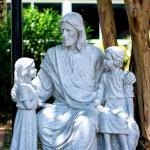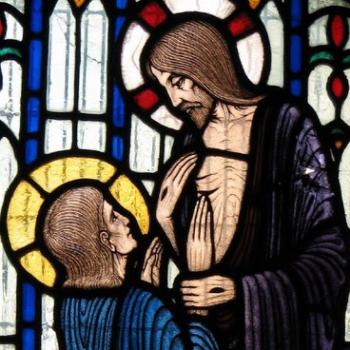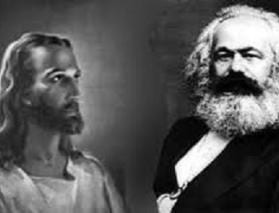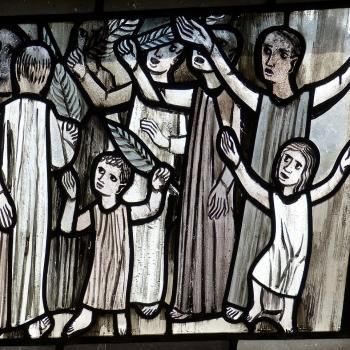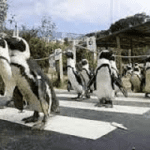Dr. Seuss was a regular in our house when my sons were young—my thirty-something sons still occasionally mention how much they both loved Green Eggs and Ham in particular. Theodor Geisel’s creatively madcap work has occasionally made it into this blog over the past five years, from the star-bellied Sneetches in an early essay on heresy to the environmentally-minded Lorax during an on-campus controversy over the demise of a 150-year-old oak.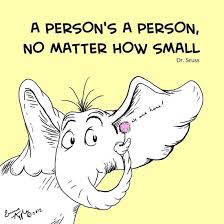
The most recent Dr. Seuss classic to cross my radar screen involves a gentle elephant who believes that “a person’s a person no matter how small,” a couple of kangaroos with bad attitudes, and other jungle animals dedicated to making the elephant’s life difficult. Early last summer someone at a conference Jeanne was attending told her that she should read Horton Hears a Who; by late summer a large orange-covered copy had arrived at our house. I paid no attention to it until a few months ago.
As I drove across town headed for minor oral surgery (a phrase that has turned out to be oxymoronic), I listened to an interview on Boston Public Radio with Ian McEwan, one of my favorite contemporary novelists. McEwan was in town on a book tour promoting his new novel, Nutshell. On the basis of the interview, I ordered the book on Amazon as soon as I got home. It is a reworking of Hamlet with a few twists, including that it is narrated by an unborn child hanging upside-down in its mother’s uterus. A la Hamlet, the unborn child knows that its mother is having an affair with its uncle and that they are plotting to kill its father. The fetus is urbane, sophisticated, listens to music and podcasts vicariously through its mother, has developed a connoisseur’s picky tastes in wine, and wonders whether there is life after the uterus.
Toward the end of the segment, the two interviewers asked McEwan to read a passage from Nutshell.
Certain artists in print or paint flourish, like babies to be, in confined spaces. Their narrow subjects may confound or disappoint some: courtship among the 18th century gentry, life beneath a sail, talking rabbits, sculpted hares, fat people in oils, dog portraits, horse portraits, portraits of aristocrats, reclining nudes, nativities by the millions, and crucifixions, assumptions, bowls of fruit, flowers in vases, and Dutch bread and cheese, with or without a knife on the side. Some give themselves in prose merely to the self.
In science, too, one dedicates his life to an Albanian snail, another to a virus. Darwin gave eight years to barnacles, and in wise later life, to earthworms. The Higgs Bosun, a tiny thing, perhaps not even a thing, is the lifetime’s pursuit of thousands. To be bound in a nutshell, see the world in two inches of ivory, in a grain of sand. Why not, when all of literature, all of art, of human endeavor, is just a speck in the universe of possible things? And even this universe may be a speck in a multitude of actual and possible universes. So, why not be an owl poet?
In the wonderfully random way that things often connect together, this passage made me think of the book that had been laying on our coffee table for the last couple of weeks: Horton Hears a Who. Horton the Elephant, while splashing in a pool, hears a small speck of dust talking to him. He comes to realize that the voice is coming from a small person who lives on the dust speck; indeed, the speck is actually a tiny planet, home to a community called Whoville, the home of microscopic creatures called Whos.
The Whos know that they are vulnerable and exposed to possible harm in a dangerous world; the mayor of Whoville asks Horton for protection, which Horton happily agrees to provide. He places the Who-planet on a clover that he proceeds to carry in his trunk as carefully as a waiter carrying a tray of crystal champagne glasses. Horton has come to the same realization as the pre-born narrator of Nutshell: Each existing thing is the center of its own universe of interests, desires, and concerns—but each existing thing is “bound in a nutshell,” “just a speck in the universe of possible things.”
The apparent insignificance of human existence prompted seventeenth-century mathematician and philosopher Blaise Pascal to write that The eternal silence of these infinite spaces frightens me. Yet in Psalm 139 we are told that
You have formed my inward parts;
You have formed me in my mother’s womb . . .
My frame was not hidden from you,
When I was made in secret
And skillfully wrought in the lowest parts of the earth.
As both Horton and McEwan’s upside-down narrator realize, everything is at the same time both insignificant and unique. The challenge is to keep both of these in mind simultaneously.
As Horton’s story proceeds, his fellow jungle animals refuse to believe that the Whos exist, believing rather that Horton is nuts. In scenes reminiscent of grade school playgrounds, various animals ridicule Horton, eventually managing to steal his Who-bearing clover and hide it from him in a large field of clovers. After a long search, Horton rescues the frightened and shaken Whos; at his prompting, they finally prove their existence to the still skeptical jungle animals by making as much collective noise as possible until everyone can hear them. Now convinced of the Whos’ existence, all the animals vow to help Horton protect the tiny community.
Each of us is both insignificant and infinitely precious, no matter what current circumstances might indicate. From within the confines of his mother’s womb, McEwan’s narrator gains insights into a world he’s not sure he will ever reach. The Whos, upon discovering just how vulnerable and fragile their world is, are discovered by someone greater than themselves, someone willing to put himself on the line again and again to preserve their special existence. It’s a wonderful retelling of a story that generations have embraced. “A person’s a person no matter how small,” after all.


